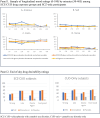Randomized Laboratory Study of Single-Dose Cannabis, Dronabinol, and Placebo in Patients With Schizophrenia and Cannabis Use Disorder
- PMID: 38900958
- PMCID: PMC11908874
- DOI: 10.1093/schbul/sbae097
Randomized Laboratory Study of Single-Dose Cannabis, Dronabinol, and Placebo in Patients With Schizophrenia and Cannabis Use Disorder
Abstract
Background and hypothesis: Up to 43% of people with schizophrenia have a lifetime cannabis use disorder (CUD). Tetrahydrocannabinol (THC) has been shown to exacerbate psychosis in a dose-dependent manner, but little research has assessed its effects on schizophrenia and co-occurring CUD (SCZ-CUD). In this double-dummy, placebo-controlled trial (total n = 130), we hypothesized that a modest dose of THC would worsen cognitive function but not psychosis.
Study design: Effects of single-dose oral THC (15 mg dronabinol) or smoked 3.5% THC cigarettes vs placebo in SCZ-CUD or CUD-only on positive and negative symptoms of schizophrenia (only for SCZ-CUD), cognition, and drug experiences assessed several hours after drug administration. SCZ-only and healthy control participants were also assessed.
Study results: Drug liking was higher in THC groups vs placebo. Neither smoked THC nor oral dronabinol predicted positive or negative symptom subscale scores 2 and 5 h, respectively, after drug exposure in SCZ-CUD participants. The oral dronabinol SCZ-CUD group, but not smoked THC SCZ-CUD group, performed worse than placebo on verbal learning (B = -9.89; 95% CI: -16.06, -3.18; P = .004) and attention (B = -0.61; 95% CI: -1.00, -0.23; P = .002). Every 10-point increment in serum THC + THCC ng/ml was associated with increased negative symptoms (0.40 points; 95% CI: 0.15, 0.65; P = .001; subscale ranges 7-49) and trends were observed for worse positive symptoms and performance in verbal learning, delayed recall, and working memory.
Conclusions: In people with SCZ-CUD, a modest single dose of oral THC was associated with worse cognitive functioning without symptom exacerbation several hours after administration, and a THC dose-response effect was seen for negative symptoms.
Keywords: THC; cannabis; cannabis use disorder; cognition; dronabinol; placebo; psychosis; randomized trial; schizophrenia.
© The Author(s) 2024. Published by Oxford University Press on behalf of the Maryland Psychiatric Research Center. All rights reserved. For commercial re-use, please contact reprints@oup.com for reprints and translation rights for reprints. All other permissions can be obtained through our RightsLink service via the Permissions link on the article page on our site—for further information please contact journals.permissions@oup.com.
Figures


References
-
- Groening JM, Denton E, Parvaiz R, et al. A systematic evidence map of the association between cannabis use and psychosis-related outcomes across the psychosis continuum: an umbrella review of systematic reviews and meta-analyses. Psychiatry Res. 2024;331:115626. - PubMed
-
- Volkow ND, Swanson JM, Evins AE, et al. Effects of cannabis use on human behavior, including cognition, motivation, and psychosis: a review. JAMA Psychiatry. 2016;73(3):292–297. - PubMed
-
- Regier DA, Farmer ME, Rae DS, et al. Comorbidity of mental disorders with alcohol and other drug abuse. Results from the Epidemiologic Catchment Area (ECA) Study. JAMA. 1990;264(19):2511–2518. - PubMed
Publication types
MeSH terms
Substances
Grants and funding
LinkOut - more resources
Full Text Sources
Medical

